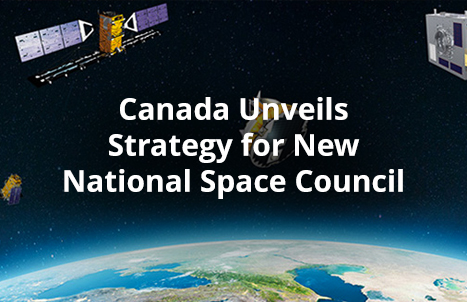
Canada has unveiled the framework for its new National Space Council. Preliminary details released last week on the Canadian Space Agency (CSA) website outline a comprehensive multi-level governance structure involving more than 20 federal departments and agencies whose responsibilities closely align with and/or derive benefits from Canada’s space capabilities and the broader space ecosystem.
The 2024 federal budget announced the establishment of a National Space Council, a “whole-of-government approach to support space exploration, space utilization, technology development, research and security”. According to the government, the new National Space Council will enable greater coherence and the level of collaboration required to address cross-cutting issues that span commercial, civil, and defence space domains.
The CSA will serve as the Secretariat for the National Space Council. As detailed on its website, the Council comprises an Assistant Deputy Ministers’ Committee co-chaired by the CSA and the Department of National Defence, with reporting lines to a deputy heads’ table.
Notably, the U.S. established its National Space Council in 1989, but it was disbanded in 1992 before being reestablished in 2017. Chaired by the U.S. Vice President, the council includes Cabinet-level Secretaries and senior executive branch officials. Since its reconstitution in 2017, the U.S. National Space Council has played a pivotal role in implementing significant space policy directives, such as the U.S. Space Priorities Framework, leading to tangible actions across multiple sectors.
The initial roster of Canadian government departments and agencies participating in the National Space Council includes:
- Agriculture and Agri-Food Canada
- Canadian Security Intelligence Service
- Canadian Space Agency
- Communications Security Establishment
- Crown-Indigenous Relations and Northern Affairs Canada
- Fisheries and Oceans Canada
- Environment and Climate Change Canada
- Finance Canada
- Global Affairs Canada
- Indigenous Services Canada
- Innovation, Science and Economic Development Canada
- Justice Canada
- National Defence
- National Research Council Canada
- Natural Resources Canada
- Parks Canada
- Privy Council Office
- Public Health Agency of Canada
- Public Safety Canada
- Public Services and Procurement Canada
- Shared Services Canada
- Transport Canada
- Treasury Board Secretariat
Additional departments and agencies will be incorporated as necessary to support the objectives of the National Space Council.
Stakeholder engagement will be key, with invitations extended to selected participants. While the specific number of stakeholders and selection criteria have not been disclosed, those chosen will participate in “select meetings” with Assistant Deputy Ministers, Vice Presidents, Deputy Heads, and Ministerial-level officials.
Fillip to the commercial space industry
The establishment of a national space council represents a significant boost to Canada’s commercial space industry, fulfilling a longstanding demand from key stakeholders. Space Canada, an organization representing approximately 80 space sector companies, has advocated for the creation of such a body to coordinate Canada’s space priorities and drive advancements in space technology within the country.
Following the budget announcement, Space Canada issued a statement expressing support for the National Space Council, highlighting its potential to enhance federal coordination efforts aimed at strengthening Canada’s space ecosystem. Additionally, the council’s establishment signals Canada’s readiness to elevate its presence on the global space stage.
Investments in the space sector are crucial for the Canadian economy, not only supporting space activities but also generating socio-economic benefits for Canadians on Earth. Studies have demonstrated that for every $1 invested in Canadian Space Agency (CSA) space development programs, there is a return of $2.2 through subsequent revenues.
A recent report, State of the Canadian Space Sector, published in June last year, underscores the significant research and development (R&D) activity in the space sector, predominantly led by the private sector. This activity supports a burgeoning downstream market in Canada and aligns with the rapid growth observed in the global space industry.
Leveraging space tech for climate action
Additionally, Canada’s space initiatives are closely tied to addressing the impending climate crisis the country is facing by leveraging Earth observation (EO) capabilities. The Strategy for Satellite Earth Observation, titled Resourceful, Resilient, Ready, unveiled in 2022, emphasizes advancing new missions to study critical issues affecting Canadians, such as the Arctic environment, air quality, water management, and forest fires.
On May 1, the CSA announced a commitment to bolstering Canada’s academic expertise in satellite data applications for climate change mitigation. It announced the allocation of $5 million in grants over three years to support post-secondary institutions in developing Earth observation applications.
This funding, part of the CSA’s smartEarth initiative, enables academia to access resources, collaborate with national and international partners, and train new highly qualified personnel. By fostering these partnerships and investments, the CSA aims to enhance Canada’s expertise in EO technologies and contribute to vital efforts in combatting climate change, aligning with the country’s environmental priorities.





Be the first to comment